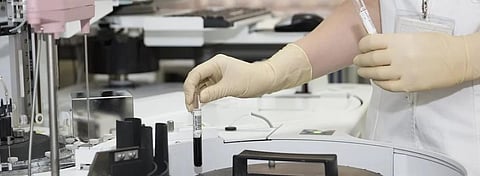

What exactly are the testing techniques being used to find whether a person is infected with novel coronavirus (SARS-CoV-2) or not?
The virus that has caused the coronavirus disease (COVID-19) is small. Each particle is just between 50–200 nanometres in diameter.
This makes direct observation under a microscope difficult. A pipeline assessment by Foundation for Innovative New Diagnostics, a global non-profit that drives research on diagnostics has divided the tests for COVID-19 into molecular assays and immunoassays.
Molecular tests
Currently, molecular assays are being used. These can be manual or automated.
When a person is suspected to be suffering from COVID-19, an oral swab is taken. Viral Ribonucleic Acid (RNA) is isolated from these swabs using a variety of chemicals.
But as this amount is very small, it is impossible to figure out the pathogen directly from this sample. To increase the test material, the polymerase chain reaction technique (PCR) is used.
The coronavirus is an RNA virus and to use the PCR technique in such a sample, an additional step of treating the sample with enzyme reverse transcriptase is needed. Once the RNA is converted to a complementary strand of Deoxyribonucleic Acid (DNA), this DNA can be replicated many times over — generally 40 times.
During the replication process, other than primers (which are specific to the viral genetic material), enzymes and nucleotides, fluorescent probes are added. These fluorescent probes are released from each strand when the copying of the strand is complete and provide a visual signal.
If the sample had the coronavirus RNA, replication would occur and the visual signal would be there.
So far, India has been using imported RT-PCR test kits. On March 23, 2020, the Indian Council of Medical Research (ICMR) approved two test kits after finding them to be 100 per cent sensitive to true positive and true negative samples.
In their press release, ICMR provided the sensitivity data for nine test kits and only Mylab Discovery Solutions Pvt Ltd’s PathoDetect COVID-19 Qualitative PCR kit and Altona Diagnostic’s RealStar SARS CoV-2 RT-PCR kit were found to be reliable.
Fourteen more private companies have been given test license by the drug regulator Drug Controller General of India (DCGI) for evaluation of the quality of their testing kits, according to media reports.
These include Roche Diagnostics India, CoSara Diagnostics from Ahmedabad and CPC Diagnostics from Chennai. These companies will evaluate their kit and present the data to the DCGI.
Immunoassays
Other than the PCR technique, rapid tests have been launched in the market. These are immunoassays, which can be manual or automated immunoassays and rapid diagnostic tests.
These follow the same principle used in pregnancy tests. They identify the IgM and IgG antibodies developed against the SARS-CoV-2. For the test, whole blood, serum and plasma can be used and if antibodies are present in the sample, these bind to the antigen immobilised on the test strip and give a coloured reaction.
Such test kits are easy to use, provides quick results and also are effective in identifying asymptomatic patients. There is a risk of getting false positives and results need to be confirmed using a more advanced test. Many such tests are available globally but not in India.